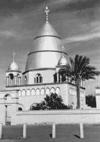- Omdurman
-
/om'door mahn"/, n.a city in central Sudan, on the White Nile opposite Khartoum: British victory 1898. 305,308.
* * *
It is situated on the left bank of the Nile River just below the confluence of the Blue and White Niles. It was an insignificant village until the victory of al-Mahdī over the British in 1885. It grew rapidly after al-Mahdī and his successor, Abd Allāh, made it their capital. It was captured by Anglo-Egyptian forces in 1898 but continued to develop into the cultural, religious, and commercial centre of The Sudan. Sites of interest include ʽAbd Allāh's house (now a museum) and the tomb of al-Mahdī. The tomb of al-Mahdi in Omdurman, The Sudan.Charles BeeryShostal/EB Inc.
The tomb of al-Mahdi in Omdurman, The Sudan.Charles BeeryShostal/EB Inc.* * *
▪ The Sudanone of the Three Towns (with Khartoum and Khartoum North), east-central Sudan (Sudan, The). Situated on the bank of the main Nile River just below the confluence of the Blue and White Niles, Omdurman was an insignificant riverine village until the victory of Muḥammad Aḥmad, known as al-Mahdī (Mahdī, al-), over the British in 1885. Al-Mahdī and his successor, the caliph Abd Allāhʿ, made it their capital, and it grew rapidly as an unplanned town of mud houses. Omdurman was captured by Anglo-Egyptian forces led by Major General Sir Herbert (later Lord) Kitchener in 1898 but continued to develop into the cultural, religious, and commercial centre of The Sudan. Whereas Khartoum is the executive capital of The Sudan, Omdurman is the country's legislative capital. ʿAbd Allāh's house is now a museum, and the tomb of al-Mahdī has been restored. The Islamic University of Omdurman (founded 1912; university status 1965), connected with the principal mosque, teaches Islamic law and theology. There is a large bazaar trading in hides, gum arabic, textiles, agricultural products, livestock, and handicrafts (in metal, wood, leather, and ivory). Furniture and pottery factories and a tannery are also important to the local economy. Trucking has largely replaced the river in the movement of goods. Pop. (1993) city, 1,271,403; (2005 est.) urban agglom., 4,518,000.* * *
Universalium. 2010.
